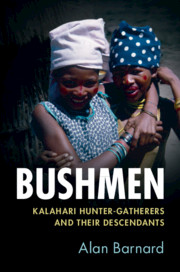Book contents
- Bushmen
- Bushmen
- Copyright page
- Contents
- Figures
- Tables
- Preface
- Pronunciation and Orthography
- 1 Bushmen
- 2 The Politics of Indigeneity
- 3 How Far Back Can We Go?
- 4 Discovery and Destruction of the /Xam
- 5 The !Xoõ and Their Neighbours
- 6 G/wi, G//ana and the Central Kalahari
- 7 Naro
- 8 Ju/’hoansi or !Kung
- 9 Hai//om
- 10 Bushmen of the Okavango
- 11 Sharing the Land with Others
- 12 Conclusions
- References
- Index
- References
7 - Naro
‘Central’, ‘Northern’ or Unique?
Published online by Cambridge University Press: 11 July 2019
- Bushmen
- Bushmen
- Copyright page
- Contents
- Figures
- Tables
- Preface
- Pronunciation and Orthography
- 1 Bushmen
- 2 The Politics of Indigeneity
- 3 How Far Back Can We Go?
- 4 Discovery and Destruction of the /Xam
- 5 The !Xoõ and Their Neighbours
- 6 G/wi, G//ana and the Central Kalahari
- 7 Naro
- 8 Ju/’hoansi or !Kung
- 9 Hai//om
- 10 Bushmen of the Okavango
- 11 Sharing the Land with Others
- 12 Conclusions
- References
- Index
- References
Summary
The Naro (formerly spelled Nharo) are the main group I worked with, from 1974 onwards. They are also the group studied by Mathias Guenther. I say ‘Central’, ‘Northern’ or unique in reference to their linguistic classification. Naro is a Khoe or ‘Central’ language, but two recent genetic studies have shown that it is highly likely that their original language was, like Ju/’hoan, a Kx’a or ‘Northern’ one. The question here is: how can this transition be explained? The answer lies in a number of factors almost all exclusive to hunter-gatherer societies: minimal material culture, very small communities, universal kinship and extreme multilingualism. These are seen in light of details that unite Naro with their northern neighbours, the Ju/’hoansi: (1) xaro (hxaro) exchange, (2) kamasi (Ju/’hoan) or kamane (Naro) exchange of bride or childbirth gifts, (3) the naming system and (4) the use of certain Kx’a kin terms rather than Khoe ones in Naro. In ancient times tiny groups speaking a Kx’a language became ‘the Naro’ that we know today. This has implications for understanding the prehistory of hunter-gatherers more generally.
Keywords
- Type
- Chapter
- Information
- BushmenKalahari Hunter-Gatherers and Their Descendants, pp. 101 - 117Publisher: Cambridge University PressPrint publication year: 2019
References
Further Reading
- 1
- Cited by

